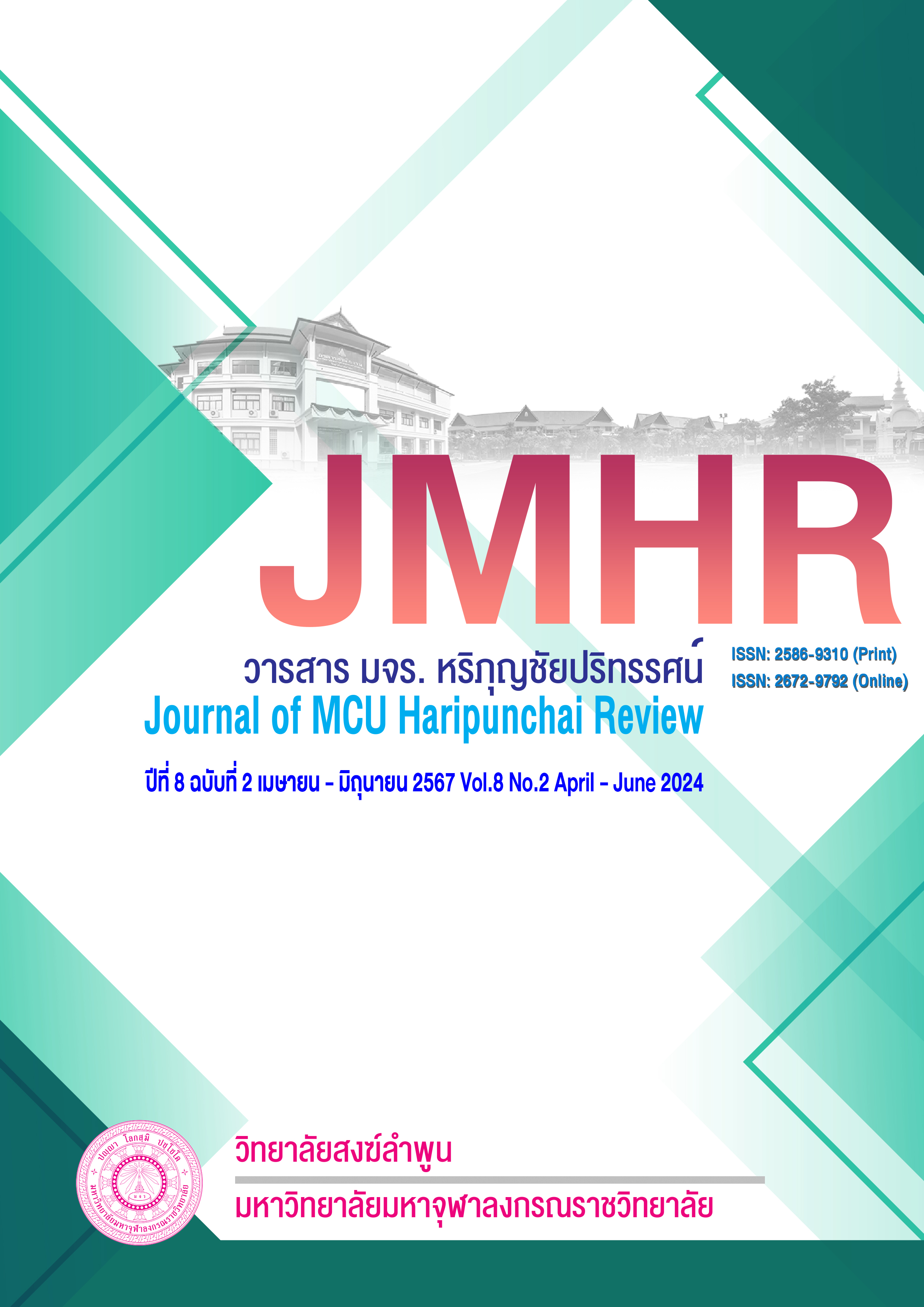The Development of Academic Administrative Model of Phrapariyattidhamma School Pali Section for Approaching The Tipitaka According to The Four Noble Truths of Watbakhuntriambhuddhasad School, Hot District, Chiang Mai Province
Main Article Content
Abstract
This research aims to 1) Study the condition of academic administration in the Pali Division and study the principles of solving problems related to the development of academic administration. 2) Create an academic administration model 3) Experiment with an academic administration model and 4) to evaluate the use of the academic management model of the Pali Section of the Phrapariyattidhamma School in order to access the Tipitaka according to the Four Noble Truths of Wat Ban Khun Triam Buddhist School, Hod District, Chiang Mai Province. Research and Development (R&D) The population consisted of 57 photographs or people. Research tools were interview forms, questionnaires, and evaluation forms. Statistics used were percentage, mean percentage, mean, standard deviation. and inferential statistics, Pair T-Test, and content analysis.
Research results found that:
1) The condition of academic administration and the study of principles for solving academic administration problems found that the curriculum and application measurement and evaluation moderate and evaluation, emphasizing analytical thinking and the application of knowledge was at a low level
2) The model of academic administration according to the Four Noble Truths found that 1) the goals of the model 2) components such as curriculum and application Teaching and learning process that emphasizes the Noble Truth Measurement and Evaluation Tutors and support resources Academic and supervision work plans and 3) driving the model towards the goal, i.e. roles and responsibilities of instructors and administrators
3) The experimental model of academic administration consisted of planning, implementing the instructional management process according to the Four Noble Truths, and assessing learner learning before and after the experiment.
4) Evaluation of the effectiveness of the academic administration model found that learners had higher learning outcomes than before using the model. The difference was statistically significant at .01. 2) The overall assessment result was at a high level.
Article Details

This work is licensed under a Creative Commons Attribution-NonCommercial-NoDerivatives 4.0 International License.
References
ชนิดาภา พรหมิ บุญเชิด ชำนิศาสตร์และพีรวัฒน์ ชัยสุข. (2566). รูปแบบการบริหารงานวิชาการตามหลักอริยสัจ 4 สำหรับครู สังกัดสำนักงานเขตพื้นที่การศึกษาประถมศึกษาสมุทรปราการ เขต 2. วารสารนวัตกรรมการจัดการศึกษาและการวิจัย. 5 (3), (พฤษภาคม – มิถุนายน) : 715-730.
บุญชม ศรีสะอาด. (2554). การวิจัยเบื้องต้น. พิมพ์ครั้งที่ 9. กรุงเทพมหานคร : สุรีวิยาสาส์น.
ประสิทธิ์ อุ่นหนองกุ่ง. (2561). รูปแบบการพัฒนาภาวะผู้นำทางวิชาการของผู้บริหารโรงเรียนพระปริยัติธรรม แผนกสามัญศึกษา ภาคตะวันออกเฉียงเหนือ. [ออนไลน์]. แหล่งข้อมูล : https://gsmis.snru.ac.th/e-thesis/thesis_detail?r=543H97107. [วันที่ 20 กรกฎาคม 2565]
พระครูปลัดศักดิ์ มหาวีโร (โกศลสุภวัฒน์). (2563). รูปแบบการจัดการเรียนการสอนตามหลักอริยสัจ 4 สำหรับนักเรียนประถมศึกษาในโรงเรียนสังกัดกรุงเทพมหานคร. ปริญญาพุทธศาสตรดุษฎีบัณฑิต (สาขาวิชาพุทธบริหารการศึกษา). บัณฑิตวิทยาลัย : มหาวิทยาลัยมหาจุฬาลงกรณราชวิทยาลัย.
พระมหาพิชิต ธมฺมวิชิโต (ดุลยลา). (2561). การบริหารโรงเรียนพระปริยัติธรรม แผนกสามัญศึกษา ตามหลักอริยสัจ 4 สังกัดสำนักงานพระพุทธศาสนาแห่งชาติ จังหวัดขอนแก่น. วิทยานิพนธ์พุทธศาสตรมหาบัณฑิต สาขาวิชาพุทธบริหารการศึกษา บัณฑิตวิทยาลัย มหาวิทยาลัยมหาจุฬาลงกรณราชวิทยาลัย.
พระพิทักษ์ บุญปัน. (2560). รูปแบบการบริหารงานวิชาการโรงเรียนพระปริยัติธรรมแผนกธรรมในเขตจังหวัดหนองคาย. [ออนไลน์]. แหล่งข้อมูล : https://so05.tci-thaijo.org/index.php/ pacific/article/download/201981/141729/. [วันที่ 20 กรกฎาคม 2565]
พระมหาจตุภูมิ แสนคำ. (2560). การบริหารงานวิชาการของโรงเรียนพระปริยัติธรรมแผนกบาลี
วัดโมลีโลกยาราม กรุงเทพมหานคร. [ออนไลน์]. แหล่งข้อมูล : https://grad.bsru.ac.th/db _research. [วันที่ 20 กรกฎาคม 2565]
พระพุธศักดิ์ แวงสูงเนิน. (2563). การพัฒนาผลสัมฤทธิ์ทางการเรียนและทักษะการคิดแก้ปัญหาเรื่อง หลักธรรมทางพระพุทธศาสนาของนักเรียนชั้นมัธยมศึกษาปีที่ 4 โรงเรียนวาปีปทุม โดยการจัดการเรียนรู้แบบอริยสัจ 4. วิทยานิพนธ์ครุสาสตรมหาบัณฑิต สาขาวิชาสังคมศึกษา บัณฑิตวิทยาลัย มหาวิทยาลัยราชภัฏมหาสารคาม.
พระครูสังฆกิจจานุรักษ์ (สิริเชษฐ์พงษ์). (2564). รูปแบบการบริหารวิชาการของผู้บริหารโรงเรียนพระปริยัติธรรม แผนกสามัญศึกษา. [ออนไลน์]. แหล่งข้อมูล : https://so06.tci-thaijo.org/index.php/BSJ/article/download/247830/168838. [วันที่ 20 กรกฎาคม 2565]
พระแดนชัย สุริยวํโส (สุริยวงศ์). (2563). การพัฒนาการจัดการเรียนรู้ รายวิชาพระพุทธศาสนา ตามหลักอริยสัจ 4 ของนักเรียนชั้นมัธยมศึกษาปีที่ 1. [ออนไลน์]. แหล่งข้อมูล : http://ojs.mcu.ac.th/ index.php/jtss/article/viewFile/6354/4006. [วันที่ 20 กรกฎาคม 2565]
โรงเรียนวัดบ้านขุนเตรียมพุทธศาสตร์. ระเบียงทัศนะ. [ออนไลน์]. แหล่งข้อมูล : https://kalyanamitra.org/th/article_detail.php?i=4265 [วันที่ 10 กรกฎาคม 2566].
สาโรช บัวศรี. (2556). วิธีการสอนตามขั้นทั้งสี่ของอริยสัจในศึกษาศาสตร์ตามแนวพุทธศาสตร์.กรุงเทพมหานคร : สำนักงานคณะกรรมการวัฒนธรรมแห่งชาติ.
สำนักงานเลขาธิการสภาการศึกษา. (2560). แผนการศึกษาแห่งชาติ พ.ศ.2560-2579. กระทรวงศึกษาธิการ.


